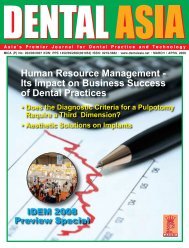Download - Dental Asia
Download - Dental Asia
Download - Dental Asia
Create successful ePaper yourself
Turn your PDF publications into a flip-book with our unique Google optimized e-Paper software.
CLINICALUPDATE<br />
of standards, and to strive to succeed. The need for power is<br />
the need to make others behave in a way that they would not<br />
have behaved otherwise. The need for affiliation is the desire<br />
for friendly and close interpersonal relationships. A person’s<br />
levels of these three needs are typically measured by reacting<br />
to a set of pictures included in the Thematic Apperception Test.<br />
Predictions about motivation can be made from a study of the<br />
three-needs theory. McClelland found that high achievers<br />
differentiate themselves from others by their desire to do things<br />
better. High achievers like moderately challenging goals. They<br />
avoid what they perceive to be very easy or very difficult tasks.<br />
Individuals with a high need to achieve prefer and are strongly<br />
motivated in work situations with personal responsibility,<br />
feedback, and an intermediate degree of risk.<br />
Applications to Dentistry: On the one hand, try to identify the<br />
type of need your patient valued most and try to focus on that<br />
for motivation. On the other hand, similar to the Maslow’s<br />
theory, this theory gives us a remainder that there are different<br />
types of needs that the patient requires. Identification of<br />
individuals with a high need for achievement can be useful in<br />
selecting motivation methods.<br />
preferable to assigning goals whenever resistance is expected.<br />
People will do better when they get feedback on how well they<br />
are progressing toward their goals because feedback acts to<br />
guide behavior and self-generated feedback has been shown<br />
to be a more powerful motivator than externally generated<br />
feedback. Several contingencies exist in goal-setting theory.<br />
Feedback influences the goal-performance relationship. Goal<br />
commitment is most likely to occur when goals are made<br />
public, when the individual has an internal locus of control, and<br />
when the goals are set by the individual rather than assigned.<br />
The other contingency is self-efficacy. It is an individual’s belief<br />
that one is capable of performing a task. The higher one’s selfefficacy,<br />
the more confidence one has in one’s ability to<br />
succeed in a task. So, in difficult situations, people with low<br />
self-efficacy are likely to reduce their effort or give up<br />
;1altogether, whereas those with high self-efficacy seem to<br />
response to negative feedback with increased effort and<br />
motivation, whereas those with low self-efficacy are likely to<br />
reduce their effort when given negative feedback. Finally,<br />
national culture is a contingency that also affects goal-setting<br />
theory. One may conclude that intentions, as defined by hard<br />
and specific goals, are a powerful motivating force in goal-<br />
Goal-setting theory<br />
Would you have done better in dental school had<br />
your teacher in the phantom head course said, ‘you<br />
should strive for a grade B or above on all your tooth<br />
preparations’ rather than telling you just to ‘try your<br />
best’? Research on goal-setting theory addresses<br />
these issues, and the findings were impressive in<br />
term of the effect that goal specificity, challenge, and<br />
feedback have on performance 6 . This is the<br />
proposition that specific goals increase<br />
performance, and difficult goals, when accepted,<br />
result in higher performance than easy goals 6 . What<br />
is known about goals as motivators? Intention to<br />
work toward a goal is a major source of job<br />
motivation. Specific and challenging goals are<br />
superior motivating forces. Specific hard goals<br />
produce a higher level of output than do generalized<br />
goals. There is no contradiction that goal-setting<br />
theory says that motivation is maximized by difficult<br />
goals, whereas achievement motivation is<br />
stimulated by moderately challenging goals. As goalsetting<br />
theory deals with people in general;<br />
achievement theory is based only on people who<br />
have a high need for achievement. Difficult goals are<br />
still recommended to motivate the majority of<br />
people. The conclusions of goal-setting theory apply<br />
to those who accept and are committed to the goals.<br />
Difficult goals will lead to higher performance only if<br />
they are accepted. People will try harder if they<br />
participate in the planning and formulation of goals<br />
although it cannot be said that participation is<br />
always desirable. Participation is probably<br />
<strong>Dental</strong> <strong>Asia</strong> • May / June 2008<br />
27





